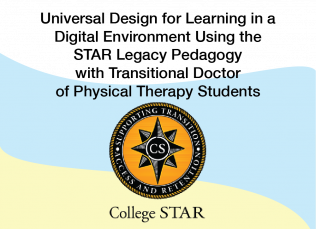
UDL in a Digital Environment Using the STAR Legacy Pedagogy
This case study depicts how the STAR Legacy Pedagogy promotes learning for diverse students who have varying levels of professional expertise and assists learners in solving authentic problems.
This resource was originally developed with resources from the College STAR grant. That grant has ended and the College STAR modules will now permanently reside at the East Carolina University Office for Faculty Excellence.
Module Introduction
The purpose of this case study is to describe how using STAR Legacy Pedagogy can assist learners in solving authentic problems. First described will be how the STAR Legacy Pedagogy promotes learning for diverse students who have varying levels of professional expertise in a post-professional Doctor of Physical Therapy program. Secondly, the UDL alignment will be discussed. Finally, the methodology for integrating this pedagogy will be depicted, and student learning outcomes will be presented.
Teaching students in any academic discipline how to solve authentic problems can be challenging. These problems often have multiple solutions, are seated in the context of experience, and require appropriate scaffolding that facilitates problem articulation, support for disciplinary knowledge, and a defined process (Quintaña et. al., 2004; Brush and Saye, 2002). In order to adequately convey content and facilitate problem solving, case based pedagogy that is supported with instructional scaffolding has been suggested as an effective evidence based strategy (Hayward & Cairns, 1998; Smith, 2018). One way to present cases using universal design for learning into technology-based environments is the STAR legacy pedagogy, which is designed for integration of case based pedagogy that provides scaffolding of the learning process. This scaffolding of the learning process is provided in three ways that are congruent to Quintaña’s (2004) recommendations for scientific problem solving that state that support should be provided for process management, disciplinary knowledge support, and articulation and reflection. First, from a process management standpoint, the STAR legacy pedagogy provides an implicit structure for problem solving in that it follows a cyclical process of learning where a problem is presented, resources to solve that problem are provided, and the learner is encouraged to provide solutions to the problem. Secondly, the STAR legacy pedagogy provides content knowledge support that is particular to the disciplinary problem. Finally, articulation and reflection, or support for metacognition, is provided as learners are asked to reflect on what they know, what they learned, and make an estimate of how much their knowledge has grown from the initial part of the learning module to the end of the learning module.
Support for this Module
Original development of this module was made possible by the College STAR (Supporting Transition Access and Retention) initiative. College STAR was a grant-funded project focused on partnering postsecondary educational professionals and students to learn ways for helping postsecondary campuses become more welcoming of students with learning and attention differences. Much of this work was made possible by generous funding from the Oak Foundation.
Organization/Publishers:
Share this resource:
Posted date:
November 11, 2022
